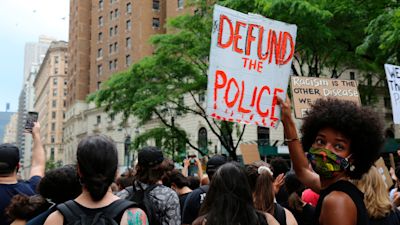Defund the police: What has the movement achieved and what does it really mean?

Words by Multimedia Producer Wedaeli Chibelushi
Calls to reallocate police funding in the US are not new. However, last summer, the campaign was amplified by protesters in the wake of George Floyd's killing.
Mr Floyd, a black man from Minneapolis, died after being arrested. Footage showed Mr Floyd repeating that he could not breathe as officer Derek Chauvin appeared to kneel on his neck.
Since then, 'defund the police' has become a rallying cry, a stick used to beat leftists with and, for some, a real possibility.
As the trial for the killing of George Floyd begins, ITV News looks at what the phrase means and how successful the campaign has actually been.
What does 'defund the police' mean?
Supporters insist the movement isn’t about eliminating police departments or gutting their budgets. They say it is time police funding is reduced and reinvested into public services like housing and education.
On their website, the official US Black Lives Matter organisation wrote: "As long as we continue to pump money into our corrupt criminal justice system at the expense of housing, health, and education investments, we will never be safe".
State and local governments spent $115 billion (£83 billion) on policing in 2017 - that's around 4% of their direct funding,
Have any governments agreed to defund their police departments?
In direct response to last summer's protests, the city council of Minneapolis, where George Floyd died, approved cuts to its police budget.
In December, the city sanctioned a shift of around $8 million (£5.7 million) from the police department toward violence prevention and other programmes.“We all share a deep and abiding reverence for the role our local government plays in service of the people of our city,” Mayor Jacob Frey said.
“Today, there are good reasons to be optimistic about the future in Minneapolis.”
Just two months later, that same council approved the spending of $6.4 million (£4.6 million) to hire dozens of police officers. The department said it only had 638 officers available to work - roughly 200 fewer than usual. It added that an unprecedented number of officers quit or went on extended medical leave after Floyd’s death and the unrest that followed.
While some residents supported cuts to the police department, others begged the city to hire more officers following the initial budget cuts. They cited longer response times and an increase in violent crime.
Further south in Austin, Texas, the city council cut this year's $434 million (£314 million) police budget by approximately one-third. This means just over $150 million (£109 million) will be redirected to social services in the 2021 fiscal budget.
According KUT Austin, a member station of public media organisation NPR, Austin's decision to cut the police budget is "not all it seems to be".Reporter Audrey McGlinchy said: "More than half of the cuts were just a reshuffling. For example, the city moved its forensics lab away from the police - same department, different oversight."
Austin's cuts have also had plenty of high profile detractors. Texas Governor Greg Abbott has vowed to sign a bill punishing cities that reduce their police department budgets.
Although he has met Mr Floyd's family to discuss eradicating police brutality, Abbott wants to freeze property tax revenues for local authorities that make cuts.
On March 25, senators in Georgia approved a bill to limit governments’ ability to cut police funding by more than 5%. The bill has now gone to the House for more debate.
Meanwhile, the Associated Press found that although other local governments, like Portland and Seattle, have trimmed police budgets over the past four months, the cuts have mostly been modest. It said cuts have been driven as much by shrinking government revenue related to the coronavirus pandemic as from calls to rethink public safety.
On a national level, House Democrats passed the most ambitious effort in decades to overhaul policing nationwide. At the beginning of March, they approved a George Floyd Justice in Policing Act which bans chokeholds and "qualified immunity" for officers.How has the police responded to calls for cuts?
Generally, police and union officials have long resisted cuts to police budgets. They argue that slashed budgets would make cities less safe.
The Los Angeles Police Protective League, the union for the city’s rank-and-file officers, said budget cuts are the “quickest way to make our neighborhoods more dangerous.”
“Cutting the LAPD budget means longer responses to 911 emergency calls, officers calling for back-up won’t get it, and rape, murder and assault investigations won’t occur or will take forever to initiate, let alone complete,” the union’s board said in a statement.
In New York, a city with one of the world’s best-funded law enforcement agencies, the police commissioner cautioned against cuts that might compromise public safety.
Police Commissioner Dermot Shea said: “I think everyone has to cut. I think we’re going to be forced to do difficult things.
“What concerns me is a moment in time and some rash judgments stepping in and taking the place of some well thought out conversations about how to cut smartly.”